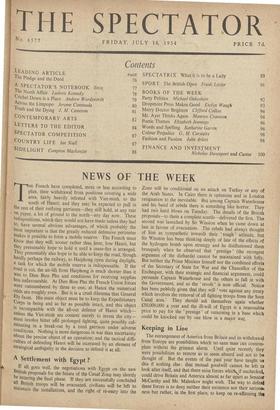NEWS OF THE WEEK
THE French have completed, more or less according to plan, their withdrawal from positions covering a wide area, fairly heavily infested with Viet-minh, to the south of Hanoi; and they may be expected to pull in the rest of their outlying garrisons—they still hold, at any rate on paper, a lot of ground to the north—any day now. These redispositions, which they would not have made unless they had to, have several obvious advantages, of which probably the most important is that the greatly reduced defensive perimeter makes it possible to form a mobile reserve. The French must know that they will, sooner rather than later, lose Hanoi, but they presumably hope to hold it until a cease-fire is arranged. They presumably also hope to be able to keep the road, though hardly perhaps the railway, to Haiphong open during daylight, a task for which the mobile reserve is indispensable. If the road is cut, the air-lift from Haiphong is much shorter than it was to, Dien Bien Phu and conditions for receiving supplies less unfavourable. At Dien Bien Phu the French Union forces were outnumbered by three to one; at Hanoi the numerical odds are roughly even. But it is a cruel dilemma that General -Ely faces. Hismain object must be to keep the Expeditionary Corps in being and as far as possible intact, and this object Is incompatible with the all-out defence of Hanoi which— unless the Viet-minh are content merely to invest the city— must involve bitter aEd prolonged fighting, quite possibly cul- minating in a break-out by a tired garrison under adverse conditions. Nothing is more dangerous in war than uncertainty about the precise object of an operation; and the tactical diffi- culties of defending Hanoi will be increased by an element of strategical ambiguity in the decision to defend it at all.


































 Previous page
Previous page